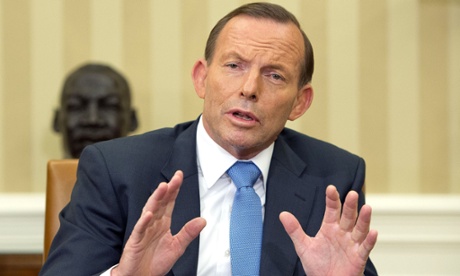Tony Abbott is no action man on climate change
Veteran US lawmaker Henry Waxman said this week of policies like Direct Action: 'That never worked anywhere'

do not want to do anything about climate change,' said Malcolm Turnbull,
who may have been wrong, but not much. Photograph: REX
Tony “conservationist” Abbott has been telling the Americans his
government supports “strong action” on climate change. Sadly, every
piece of available evidence says the opposite.
First, his policy
is a competitive government grants scheme in which participation by
polluters is voluntary. As veteran US lawmaker Henry Waxman told the ABC
this week: “That never worked anywhere.”
Actually, we didn’t really need a US politician to tell us that. It was the advice of the 2007 Shergold
report to the Howard government, which said carbon pricing was better
because regulatory approaches would “impose a far heavier burden on
economic activity" and in 2010, when the auditor general was scathing about a similar competitive grants scheme run by the Howard and Rudd governments.
Second,
Abbott’s contention that his $2.5bn “Direct Action” plan is equivalent
to a $40bn program if it were scaled up to US economy proportions is
actually not proof that Australia is doing a lot (we are still aiming
only for the bare minimum target of a 5% reduction in emissions by 2020)
but instead clear evidence that Direct Action is an extremely expensive
way to (maybe) achieve this modest emissions reduction.
After
Obama’s cap and trade scheme failed to make it through the Congress he
is also using non-market ways to reduce emissions, mainly new rules and
regulations, but not direct government handouts.
The Coalition has also been warned about the costs of voluntary grants schemes. For example the “blue book” prepared by the Treasury for a possible incoming Coalition government in 2010 said
“a market mechanism can achieve the necessary abatement at a cost per
tonne of emissions that is far lower than alternative direct-action
policies”. And Malcolm Turnbull made the same point
in his speech to parliament after he was deposed as leader because of
his support for an emissions trading scheme, when he said direct-action
style schemes were “a recipe for fiscal recklessness on a grand scale”
and “schemes where bureaucrats and politicians pick technologies and
winners, doling out billions of taxpayers’ dollars, neither are
economically efficient nor will be environmentally effective”.
Third,
the actual measure of “strong action” on climate change is how deeply
countries are willing to cut their emissions, not how they get there.
Before the election, Abbott and the environment minister, Greg Hunt,
regularly restated a Coalition commitment to increase Australia's 2020
emissions reduction target to up to 25% under a specific set of
conditions for global action set down in 2009 and accepted by both major
parties.
After the election the independent Climate
Change Authority advised the conditions for a target higher than 5% had
already been met, and when compared with the actions of other countries,
5% no longer represented a "credible option".
But Abbott insisted;
“Australia will meet our 5% emissions reduction target, but this
government has made no commitments to go further than that. We certainly
are in no way looking to make further binding commitments in the
absence of very serious like binding commitments from other countries,
and there is no evidence of that.”
The Coalition now
intends to abolish the Climate Change Authority. It has not said how it
will decide on a post-2020 emissions reduction target ahead of the next
big international meeting in Paris next year.
Fourth,
available modeling says $2.5bn is not enough to meet even the minimum 5%
target and doing anything beyond that, which Australia obviously
eventually must, would be prohibitively expensive. This is not
government modelling, because the government hasn’t done any.
Modelling
by Reputex climate analytics, commissioned by the environment group
WWF-Australia, found that the money set aside by the Coalition to buy
abatement was likely to fall short by $5.9bn a year between 2015 and
2020, or between $20bn and $35bn in total. Modeling by Sinclair Knight Merz/MMA and Monash University's Centre of Policy Studies, commissioned by the Climate Institute,
which used assumptions more generous to the Coalition, found it would
need at least another $4bn. Abbott has said if Direct Action falls short
he will not allocate any more money.
Fifth, the
government is not only repealing the carbon price but also almost every
other related government policy or program, including the Clean Energy
Finance Corporation, the Australian Renewable Energy Agency and the
Climate Commision, and has appointed a self-professed climate sceptic, businessman Dick Warburton, to review the renewable energy target, with a strong expectation the target will be wound back.
Sixth,
Abbott rejects the link between climate change and extreme weather
events, rejects the idea that climate change may mean that all the coal
in Australia cannot be sold and burned, and the government does not
reference climate change in policies which climate science suggests
would be impacted by it, for example the drought white paper.
In 2009, Turnbull, still smarting at his demise, wrote:
“The fact is that Tony and the people who put him in his job do not
want to do anything about climate change. They do not believe in
human-caused global warming. As Tony observed on one occasion 'climate
change is crap' or if you consider his mentor, (then) senator (Nick)
Minchin, the world is not warming, it’s cooling and the climate change
issue is part of a vast leftwing conspiracy to de-industrialise the
world.”
Turnbull may have been wrong. Abbott may have
revised his views since then. But on the basis of the available
evidence, not by much. It may indeed be possible to meet credible
greenhouse emission reduction targets in an affordable way using
policies other than a carbon price. But on the basis of the available
evidence, not by using this policy.
Lenore Taylor is the political editor of Guardian Australia. She is
a Walkley award winner and a winner of the Paul Lyneham award for
excellence in press gallery journalism. She co-authored a book,
Shitstorm, on the Rudd government's response to the global economic
crisis.
a Walkley award winner and a winner of the Paul Lyneham award for
excellence in press gallery journalism. She co-authored a book,
Shitstorm, on the Rudd government's response to the global economic
crisis.


No comments:
Post a Comment